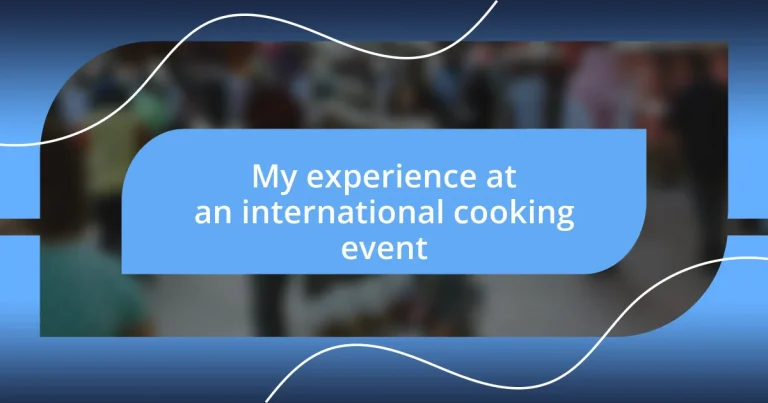Key takeaways:
- The event highlighted the power of food as a universal language, fostering connections and cultural exchanges among participants.
- Challenges such as ingredient substitutions and communication barriers taught the importance of adaptability and creativity in the kitchen.
- Collaboration and continuous learning were essential, with shared experiences enhancing the culinary journey and inspiring innovative ideas.
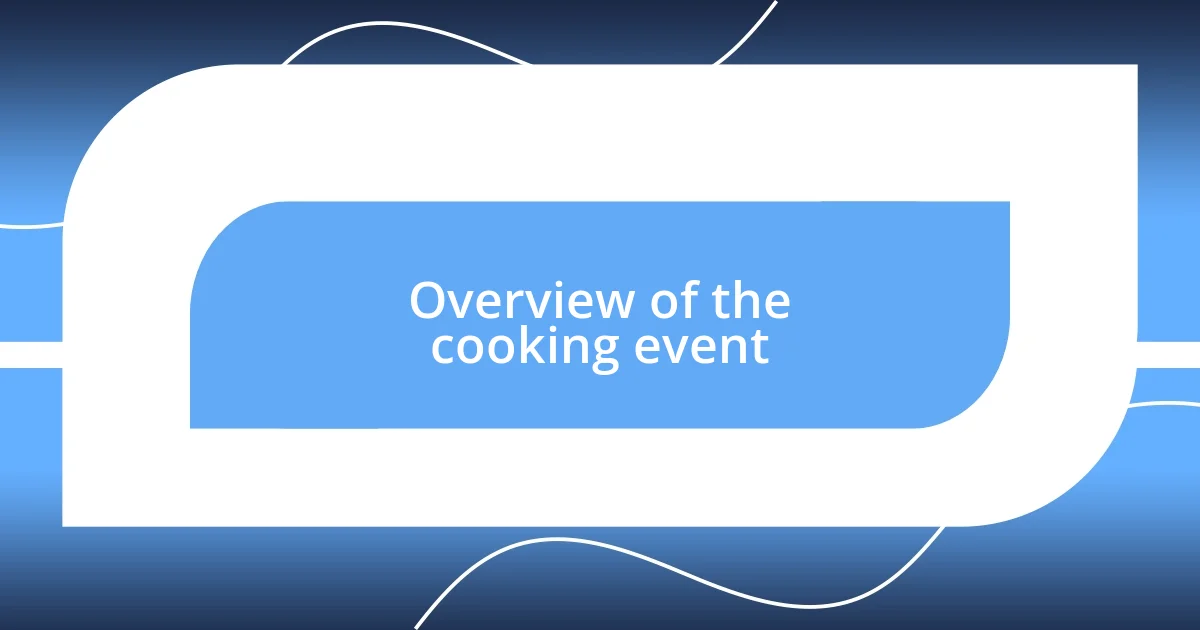
Overview of the cooking event
The cooking event was a vibrant gathering of culinary enthusiasts from around the globe, each eager to showcase their unique flavors and techniques. I remember stepping into the venue, immediately enveloped by the rich aromas of spices and fresh ingredients, sparking a sense of excitement and possibility. Can you imagine standing shoulder to shoulder with chefs who have trained in Michelin-star kitchens and home cooks wielding family recipes passed down through generations?
Throughout the festivities, workshops and live demonstrations took center stage, creating an atmosphere charged with creativity and camaraderie. Experiencing the passion of each participant was nothing short of inspiring; it reminded me of my own journey in the kitchen, where every dish tells a story. Seeing the diverse styles of cooking side by side made me reflect: how does culture influence our culinary choices?
Another highlight was the communal meals, where participants from different backgrounds shared not just food, but also personal narratives connected to their dishes. I’ll never forget a particularly heartwarming moment when a chef shared his grandmother’s recipe for paella, evoking memories of family gatherings from my own childhood. It made me ponder deeply: isn’t food a universal language that speaks to our heart and connects us all?
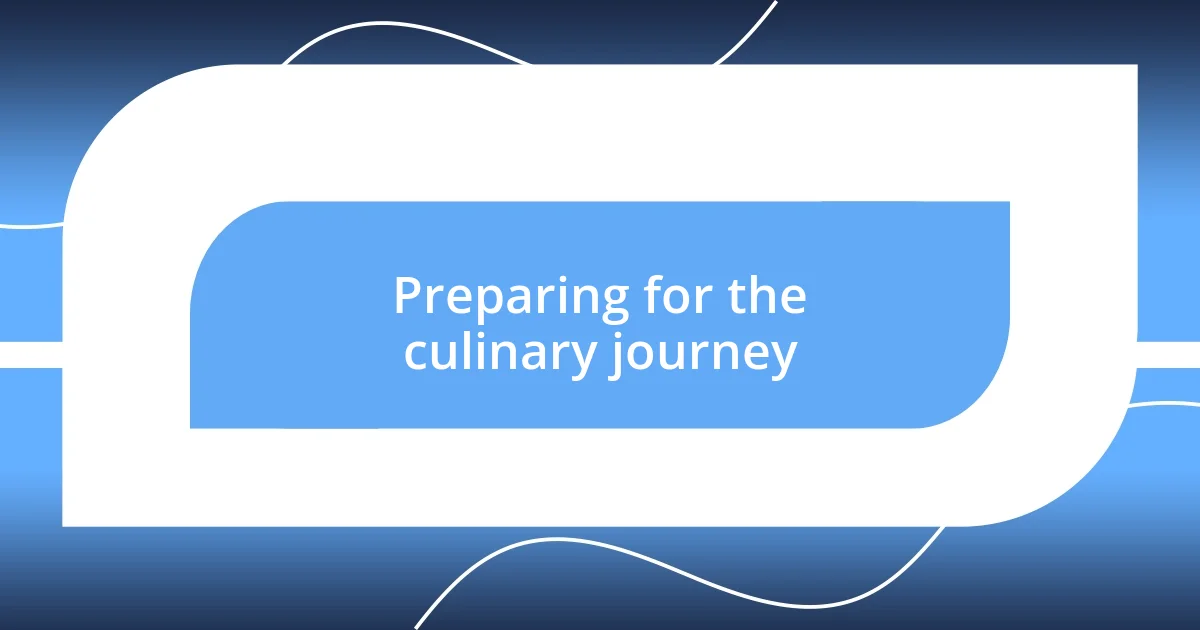
Preparing for the culinary journey
Preparing for an international culinary journey is like gearing up for an exciting adventure. I remember the thrill of packing my knives alongside my favorite spices, knowing they would be my trusted companions. The anticipation grew as I researched the countries represented at the event, eager to dive into their culinary traditions and techniques.
Here are some things to consider as you prepare for your own culinary experience:
- Research: Learn about the cuisines and chefs you’ll encounter. This helps you appreciate their dishes more.
- Packing Essentials: Bring your essential kitchen tools, like sharp knives and measuring cups, but also consider packing a notebook for recipes and inspiration.
- Mindset: Adopt a curious and open mindset. Embrace mistakes as learning moments.
- Cultural Sensitivity: Understand the cultural significance behind certain dishes—this adds depth to your culinary experience.
- Dress Comfortably: Ensure your attire is suitable for cooking; comfort is key when you’re on your feet.
The excitement of learning new techniques and tasting unfamiliar flavors truly fuels your passion for cooking. I remember being both nervous and eager as I prepared to interact with fellow cooks who had vastly different experiences than mine. This is where the real exchange begins—to share, learn, and grow together in the kitchen.
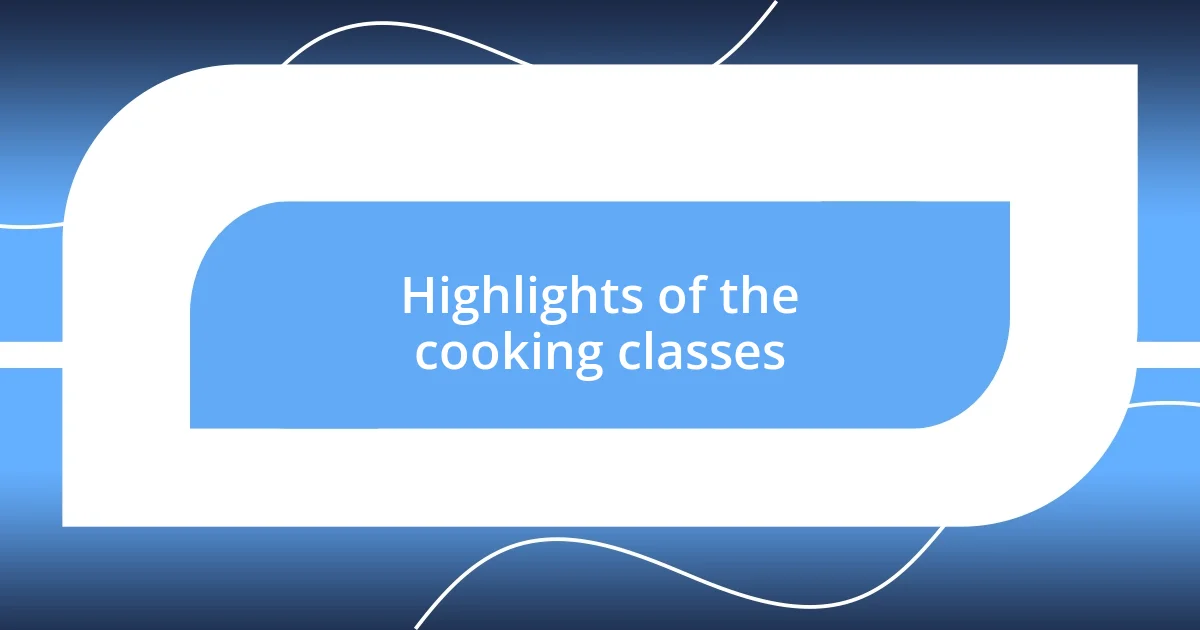
Highlights of the cooking classes
The cooking classes at the event were an absolute treasure trove of knowledge. Each session was designed not just to teach a recipe but to share a philosophy around food. For instance, during a class focused on Italian pasta-making, I was struck by how we emphasized the simplicity of ingredients and the importance of technique over intricate plating. I can still remember the thrill of mastering the art of rolling out the dough just right—it felt like reclaiming a tiny piece of culinary tradition for myself.
One particular highlight was the hands-on experience we had with fermentation. It was fascinating to witness firsthand how something as simple as cabbage transforms into tangy kimchi through a magical process of time and transformation. As participants worked alongside each other, laughter and questions filled the air, breaking down barriers. I’ve always believed that cooking is a communal experience, and this class reinforced it; we were all students of nature and nurture, eager to learn together.
The atmosphere in these classes was electric, where every mistake was met with encouragement rather than criticism. I vividly recall a moment when someone accidentally dropped their freshly made dough. Instead of feeling defeated, we all rallied to help, turning it into a humorous learning moment. It’s moments like these that remind me how cooking is not just about the food; it’s about the connections we foster along the way.
| Class Highlights | Emotional Insights |
|---|---|
| Pasta-Making | Mastering tradition connected me to my roots. |
| Fermentation Techniques | The thrill of transformation inspired creativity. |
| Supportive Atmosphere | A sense of community made every mistake a lesson. |
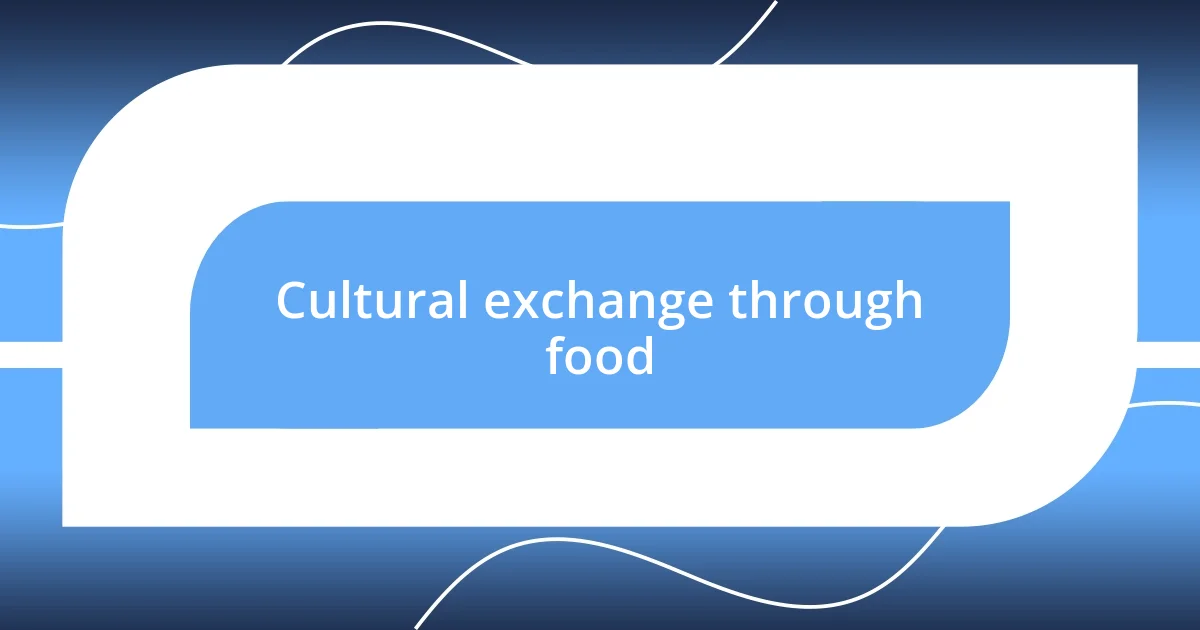
Cultural exchange through food
Food has an incredible ability to bridge cultural divides, don’t you think? I recall sharing a kitchen with a chef from Thailand who introduced me to the intricacies of balancing flavors in a Pad Thai. As she explained the significance of each ingredient, it was clear that this dish held stories of her childhood. Through our conversations, I experienced a deep understanding of her culture, all through the art of cooking.
There’s something profoundly humbling about learning new recipes while also exchanging personal stories. I remember a moment when a fellow cook from Mexico invited me to try her grandmother’s secret mole recipe. As I tasted the rich, complex flavors, I felt a rush of emotions. It was as if her family’s history was encapsulated in that sauce—her love and tradition poured into every spoonful. This kind of exchange isn’t just about copying techniques; it’s about understanding the heart and soul behind each dish.
In those moments, I realized that every meal we create has the potential to tell a story. Isn’t it fascinating how a simple plate of food can open doors to histories and friendships? Through food, we not only share flavors but also create a community grounded in appreciation and respect for diverse cultures. Each bite became a testament to our unique heritages and a celebration of what we can learn from one another.
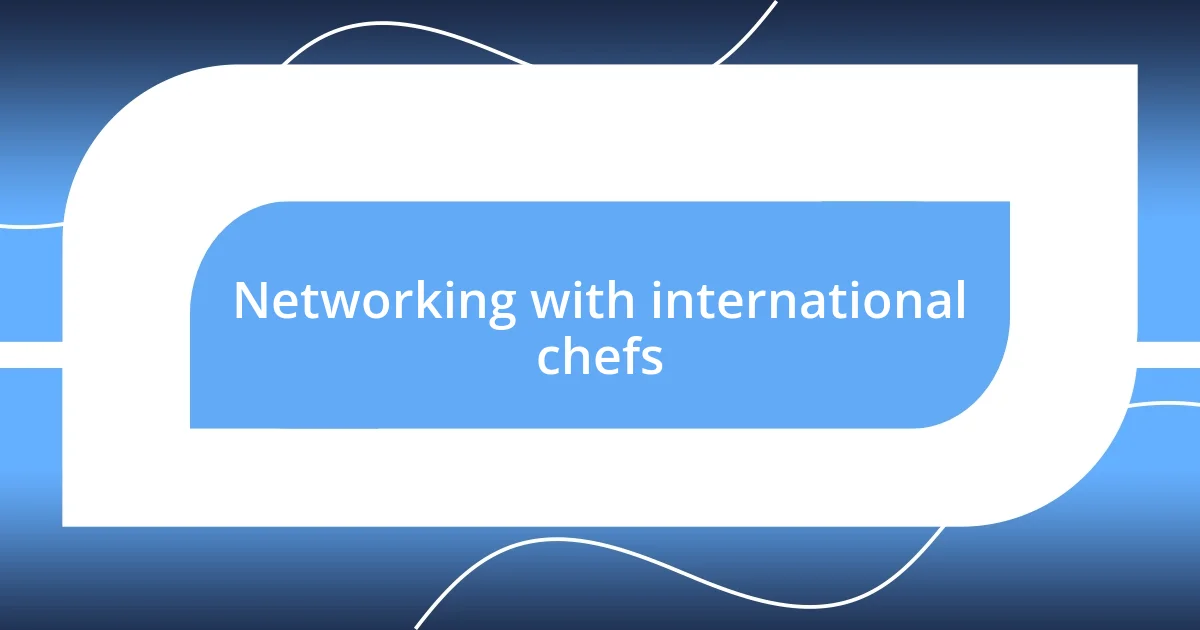
Networking with international chefs
When I networked with international chefs, the energy was electric. I vividly remember conversing with a French chef who shared not only technical skills but also a deep passion for using local, seasonal ingredients. It hit me how vital it is to connect over shared philosophies in cooking. Have you ever noticed how conversations about food draw people closer together? In that moment, I realized we were all connected through a profound appreciation for the craft.
I also found myself engaged in a lively discussion with a Japanese chef about the artistry of sushi. As he meticulously detailed the significance of each ingredient, I felt like I was stepping into a world of tradition and respect. Sharing our culinary journeys made me reflect on how networking isn’t only about exchanging contacts; it’s about building genuine connections that enrich our understanding of the culinary landscape.
One particularly memorable interaction was with a chef from Brazil, who had an infectious enthusiasm for feasting and community. He urged us to embrace the joy of gathering around a table, where every dish could ignite conversations and friendships. Can you imagine the possibilities that unfold when chefs from different corners of the world come together? It’s these moments of shared laughter and stories that leave a lasting impact, reminding us that in cooking, just like in life, relationships are the key ingredient.
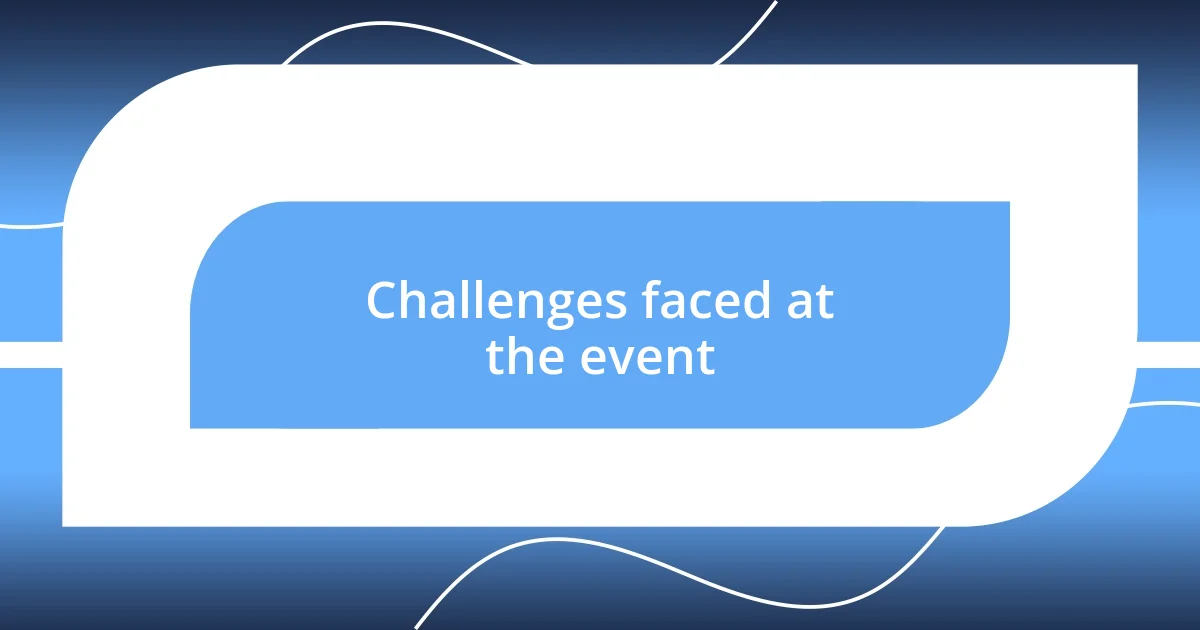
Challenges faced at the event
Navigating the bustling kitchen during the event was a challenge in itself. Picture this: dozens of chefs from various cultures racing against the clock, each with their own techniques and preferences. I found myself trying to adapt to the fast-paced energy while still focusing on my own dish. It was exhilarating but also overwhelming—how do you maintain your culinary identity in a sea of diverse contributions?
Another significant challenge arose when it came to ingredient substitutions. I remember reaching for a key spice only to discover it was out of stock, leading to a mild panic. It forced me to get creative, as I had to think on my feet and find a substitute that wouldn’t compromise my dish. Have you ever experienced that sinking feeling when something doesn’t go as planned in the kitchen? In those moments, innovation becomes essential, transforming obstacles into opportunities.
Communication also played a crucial role in overcoming challenges. While we were all there for a common goal, language barriers sometimes led to misunderstandings. I vividly recall struggling to translate a specific cooking technique to a fellow chef who didn’t speak much English. But instead of feeling defeated, I embraced the world of gestures and shared laughter, realizing that passion for cooking transcends words. It reminded me that even when faced with frustrations, we could always connect through the universal language of food.
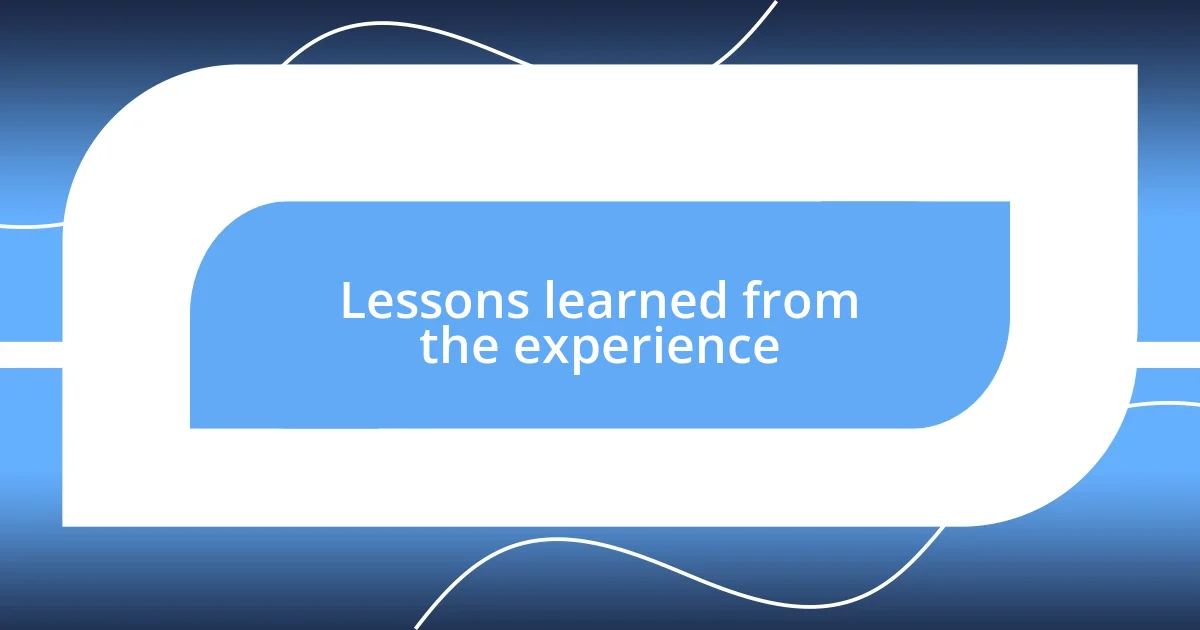
Lessons learned from the experience
The most significant lesson I learned during the event was the importance of adaptability. I remember a moment when my initial dish idea morphed into something entirely different due to the limited availability of certain ingredients. It was frustrating at first, but this experience taught me to embrace change and see it as a canvas for creativity rather than a setback. Have you ever found that some of your most innovative ideas sprang from unexpected challenges?
Another takeaway was the art of collaboration. I vividly recall dicing vegetables with a chef from Morocco, and we couldn’t help but share our stories and techniques. That spirit of teamwork transformed what could have been a solitary experience into one filled with camaraderie. Imagine the power of two minds working in sync—each bringing a unique flair to the dish! It reminded me that cooking isn’t just about individual talent; it’s about harmonizing diverse skills to create something extraordinary.
Finally, the event reinforced the value of continuous learning. Each chef had a wealth of knowledge to share, and I was amazed by how much I absorbed just by watching and listening. There was a particularly poignant moment when a chef from Italy showcased a pasta technique I had never seen before. It was a lightbulb moment—how often do we stop to learn from those around us, even in familiar areas? I walked away realizing that every experience is an opportunity for growth, especially in the kitchen where there’s always more to discover.












